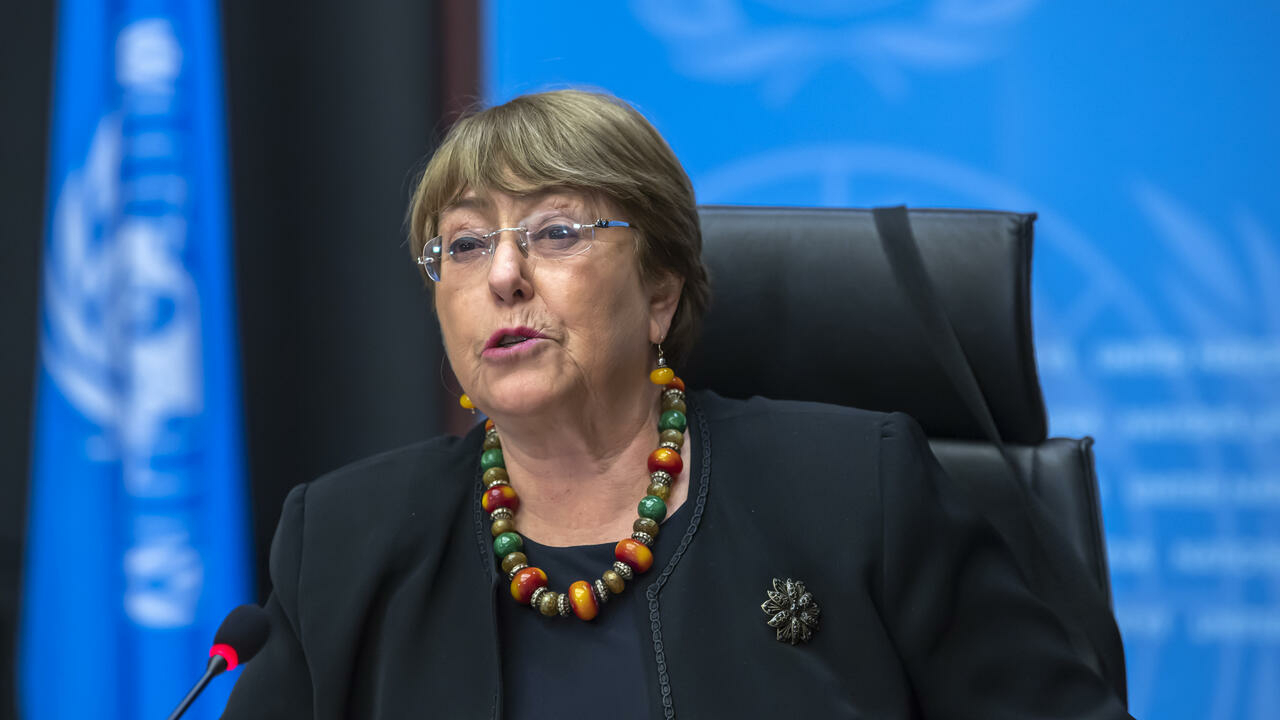
In this December 9, 2020 file photo, UN High Commissioner for Human Rights Michelle Bachelet speaks during a news conference at the United Nations in Geneva, Switzerland.
The UN rights envoy on Saturday defended her contentious visit to China, but urged authorities to avoid “arbitrary and indiscriminate” measures in Xinjiang, a region where Beijing is accused of widespread human rights abuses.
Advertising Read more
Michelle Bachelet’s long-planned trip this week has taken her to the far-western region, where China is alleged to have detained over a million Uyghurs and other Muslim minorities, as well as carried out forced sterilisation of women and coerced labour.
But Bachelet insisted Saturday her visit was “not an investigation”.
The United States has labelled China’s actions in Xinjiang a “genocide” and “crimes against humanity”, allegations vehemently denied by Beijing which says its security crackdown was a necessary response to extremism.
Bachelet has come under fire from rights groups and Uyghurs overseas, who say she has stumbled into a six-day Communist Party propaganda tour, including a virtual meeting with President Xi Jinping in which state media suggested she supported China’s vision of human rights.
Her office later clarified that her remarks did not contain a direct endorsement of China’s rights record.
Speaking at the end of her trip while still inside China, Bachelet framed her visit as a chance for her to speak with “candour” to Chinese authorities as well as civil society groups and academics.
“This visit was not an investigation,” she told reporters, later insisting she had “unsupervised” access to sources the UN had arranged to meet in Xinjiang.
She said she had met the provincial Communist Party boss as well as security chiefs in one of the most tightly surveilled places on earth.
China says it has been forced to conduct “counter-terrorism” operations in Xinjiang, but rights groups allege mass detentions of entire communities of mainly Uyghurs, many of whom have had no chance to communicate with their families outside for several years.
“We are aware of the number of people seeking news on the fate of loved ones… This and other issues were raised with authorities,” Bachelet said, declining to add detail given the sensitivity of the issue to China’s security apparatus.
It is the first trip to China by the UN’s top rights envoy in 17 years and comes after painstaking negotiations over the conditions of her visit, which the UN says is neither a fact-finding mission nor a probe.
‘Pretty transparent’
In her strongest comments aimed at Beijing, Bachelet urged China to avoid “arbitrary and indiscriminate measures” in its crackdown in Xinjiang — but also said she recognised the damage caused by “violent acts of extremism.”
Bachelet visited the Xinjiang cities of Urumqi and Kashgar, but no photos or further details of her itinerary were released during the trip.
The envoy said she had visited a prison in Kashgar, where she saw prisoners and an internal court of appeal, describing her access as “pretty open, pretty transparent”.
The Xinjiang government had assured her that a network of “vocational training centres” — which rights groups say are forced re-education camps — have “been dismantled”, she said, adding that she had visited a former re-education centre.
Beijing announced in 2019 that all “trainees” had graduated from “vocational training centres”, but rights groups allege that many detainees were transferred to factories where forced labour was used, or instead moved to Xinjiang’s ballooning network of prisons.
A Chinese foreign ministry spokesperson said earlier this week that Bachelet’s activities were “arranged according to her will and on the basis of thorough consultations of the two sides”.
State media has only covered meetings with Xi and foreign minister Wang Yi, during which he gave her a book of Xi quotes on human rights.
Her trip has taken place under a “closed loop”, ostensibly due to Covid-19 risks.
The United States has reiterated its view that Bachelet’s visit was a mistake after the release of thousands of leaked documents and photographs from inside the system of mass incarceration this week, while the UK and Germany have voiced their concerns at the visit.
(AFP)
Daily newsletterReceive essential international news every morning Subscribe







